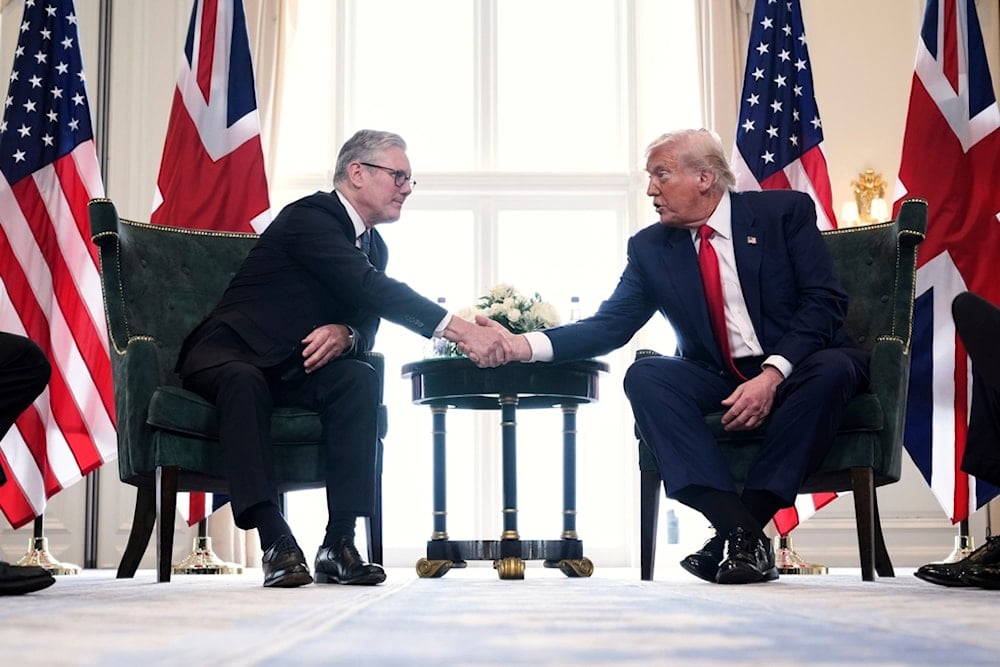Trump, Starmer discuss Gaza ceasefire, UK recognition of Palestine
Trump and UK PM Starmer meet in Scotland to discuss Gaza ceasefire, Ukraine war, and Palestinian statehood amid pressure for the UK to recognize Palestine.
-

President Donald Trump, right, shakes hands with Britain's Prime Minister Keir Starmer during a meeting at the Trump Turnberry golf course in Turnberry, Scotland Monday, July 28, 2025 (AP)
US President Donald Trump and UK Prime Minister Keir Starmer met Monday at Trump’s Turnberry golf resort in Scotland, with Gaza, Ukraine, and transatlantic trade topping the agenda. In remarks to reporters before their closed-door talks, Trump said a ceasefire in Gaza was “possible” and vowed to shorten his 50-day ultimatum to Russian President Vladimir Putin to end the war in Ukraine.
The meeting came amid growing international concern over starvation in the besieged Gaza Strip, as well as political pressure on Starmer to follow France’s lead in recognizing a Palestinian state.
Trump, speaking alongside Starmer and his wife Victoria, said he was “very disappointed” in Putin’s actions in Ukraine and would be “reducing” the timeline he previously gave Moscow. “I’m disappointed in President Putin, very disappointed in him,” he told reporters. “So we’re going to reduce that 50 days to a lesser number.”
Trump calls for Gaza humanitarian relief
On Gaza, Trump emphasized the need for humanitarian relief before any political solution. “It’s necessary to focus on a humanitarian basis before doing anything else. The kids need to be fed,” he said, rejecting claims by Israeli Prime Minister Benjamin Netanyahu that there is no hunger in the territory. “Based on television, I would say not particularly, because those children look very hungry.”
A spokesperson for Starmer confirmed the prime minister would propose a UK-led peace initiative for Gaza during the meeting, which aims to deliver immediate humanitarian aid and chart a path toward a two-state solution. The spokesperson said Starmer would continue consultations with his cabinet and international partners, including Arab states, “in the coming days.”
The UK’s position on Palestinian statehood is also under scrutiny. While Starmer has not committed to a timeline, his spokesman said recognition is “a case of when, not if.” French President Emmanuel Macron has already announced that Paris will recognize Palestine in September, and over 220 MPs in the British parliament, including many from Starmer’s Labour Party, have urged the UK to do the same.
Trump says Gaza aid must be global
Speaking on Sunday, Trump said the US would increase humanitarian aid to Gaza but urged other countries to contribute more. “It’s not a US problem. It’s an international problem,” he said, also accusing Hamas of “stealing the food” and selling it after it enters the enclave.
Truckloads of aid began entering Gaza on Monday after the Israeli regime declared a “tactical pause” in some areas to allow relief delivery, though aid agencies say the supplies fall far short of what’s needed to prevent widespread famine.
UN Secretary-General Antonio Guterres warned against the use of hunger as a weapon of war. “Hunger fuels instability and undermines peace. We must never accept hunger as a weapon of war,” he said at a UN conference.
Trade, tariffs remain unsettled
The Trump-Starmer meeting also came on the heels of a new EU-US trade deal designed to avert a broader tariff conflict. Starmer and Trump were expected to discuss the implementation of a separate UK-US trade agreement signed in May, which lowered tariffs on select British exports but has not yet come into force.
Trump has praised the agreement as “great,” but UK Business Secretary Jonathan Reynolds said Monday that critical issues remain unresolved. “It wasn’t job done,” Reynolds told the BBC, cautioning against expectations of a breakthrough on steel and aluminium tariffs.
US-EU trade deal draws EU criticism over inequality
A contentious trade agreement between the US and EU, finalized at Donald Trump’s Scottish golf resort, has drawn sharp rebuke from France and German industry groups. While the deal averts steeper tariffs, critics say it imposes unfair burdens on European exporters and marks a troubling shift in transatlantic relations.
The new US-EU trade agreement, sealed on Sunday in a ballroom at Trump’s golf resort in Scotland, introduces a 15% tariff on nearly all European exports to the US, including automobiles. While the deal averts Trump’s looming August 1 deadline that threatened a 30% tariff hike, it falls short of the zero-tariff trade framework initially proposed by the EU.
The accord subjects EU exporters to significantly higher duties, replacing the current average tariff of 4.8% with rates more than triple in some sectors. Negotiations are still ongoing regarding steel, which remains under a 50% tariff, as well as aviation and pharmaceutical exports, which face continued uncertainty.
France decries ‘submission’ to US demands
French Prime Minister Francois Bayrou condemned the agreement as a capitulation to US pressure. “It is a dark day when an alliance of free peoples…resolves to submission,” he wrote on X. His statement reflects growing frustration within Paris over the EU’s perceived concessions.
German Chancellor Friedrich Merz offered cautious praise for the deal, noting it avoids a full-blown trade war. However, key German industry groups voiced alarm. The BDI industrial federation warned of “considerable negative repercussions,” while the VCI chemical association criticized the high tariff levels.
In a related vein, France's European Affairs Minister Benjamin Haddad reacted to the deal early on Monday, saying it had some merits, such as exemptions for some key French business sectors, but was "unbalanced".

 6 Min Read
6 Min Read









